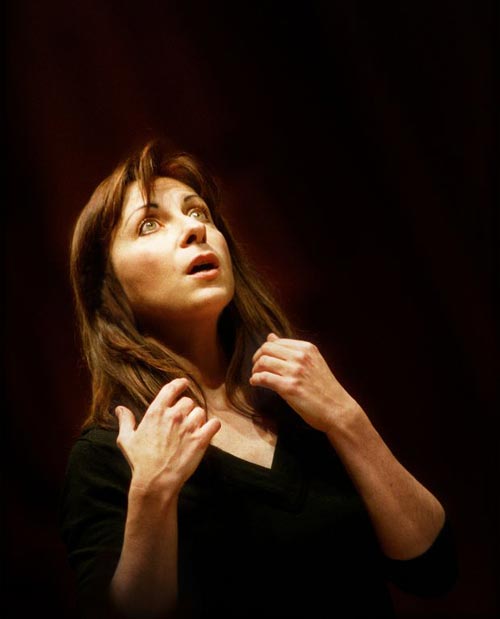Dessay / Pido / Concerto Köln, Barbican, London<br /> Isserlis / Karabits / Philharmonia, Fairfield Hall, Croydon<br />A Midsummer Night's Dream, Linbury Studio, London
The show must go on, even with a stinking cold

Your support helps us to tell the story
From reproductive rights to climate change to Big Tech, The Independent is on the ground when the story is developing. Whether it's investigating the financials of Elon Musk's pro-Trump PAC or producing our latest documentary, 'The A Word', which shines a light on the American women fighting for reproductive rights, we know how important it is to parse out the facts from the messaging.
At such a critical moment in US history, we need reporters on the ground. Your donation allows us to keep sending journalists to speak to both sides of the story.
The Independent is trusted by Americans across the entire political spectrum. And unlike many other quality news outlets, we choose not to lock Americans out of our reporting and analysis with paywalls. We believe quality journalism should be available to everyone, paid for by those who can afford it.
Your support makes all the difference.Like night buses and knickers, divas with hacking coughs come in pairs. Last Saturday, approximately 90 minutes after Anna Netrebko left her real-life sickbed to sing "Sempre libera" in the Royal Opera House production of La Traviata, Natalie Dessay delivered the same aria in a shaky, if exhilarating, recital with Concerto Köln and Evelino Pido. As she was frail, pale and battling a thick film of phlegm, it says much about Dessay's strength of character that she chose not to cancel. Instead, she cleared her throat, ignored the odd cut in her upper register, and went to work.
A celebrated comedian, Dessay is also a compelling tragedian. Arms outstretched, fingers splayed, bruised heart on matt-black sleeve, she has the fierce charisma of a torch-song chanteuse. Which is great if you're belting out "Elle fréquentait la rue Pigalle" but little help in the filigree coloratura of bel canto. Aided by the musky timbre of Concerto Köln's period instruments, her arias were scrupulously shaded: girlishly tender in Gilda's "Caro nome", delirious in the long sequence from I Puritani, proud and lonely in Maria Stuarda's "O nube", sardonic, rueful and hedonistic in Violetta's monologue. But although the top E flat of "Sempre libera" was bright and true and the final trill of "Caro nome" exquisite, her articulation was bizarrely reminiscent of Whitney Houston or Christina Aguilera: fiddly, twiddly and all in the throat. Frustrated as she obviously is with playing opera's tomboys, dolls and delicate flowers, Dessay has a delicate voice. Perhaps too delicate to be singing this repertoire through a cold.
Only 45 minutes from the Barbican, Croydon's Fairfield Hall is another world. Opened in 1962, the venue desperately needs the kind of makeover given to the Royal Festival Hall. But its acoustics are pleasant; its kiosk offers glow-in-the-dark magic wands, and where else can one hear Steven Isserlis and the Philharmonia in the same building as a belly-dancing class? First of four performances of Dvorak's Cello Concerto (the last is in Leicester tonight), this was also the debut of hot-shot Ukrainian conductor Kirill Karabits.
Quick and clear in his movements, Karabits favours sharp dynamics and fast tempi. Mussorgsky's Night on the Bare Mountain flew by in a blizzard of biting semi-quavers and volcanic brass, while his driven reading of Sibelius's Second Symphony was more eloquent on its status as a symbol of Finnish resistance than its private sorrow at the death of the composer's sister-in-law.
Mussorgsky excepted, the whole programme was about dead sisters-in-law, and though Isserlis's performance traced the pain and joy of Dvorak's intense love for Josefina Cermakova, I was not persuaded that Karabits was equally moved. Still, the orchestra was on brilliant form, and the sudden ray of sunshine in the coda, where Isserlis turned away as though he too could not bear the memory of Josefina's youth, was shattering.
It's been a good week for poignant moments, not least Katie Van Kooten's despairing wail of "I am as ugly as a bear!" in Olivia Fuchs's 2005 production of A Midsummer Night's Dream. Untrue, of course, for Van Kooten's Helena is as good-looking as the rest of this good-looking, good-sounding cast. Shaded in turquoise and indigo, with pyjama'd fairies (the magnificent Tiffin Boys' Choir), smart-suited lovers (Van Kooten, Daniela Lehner, Ed Lyon, Jacques Imbrailo), a kittenish Titania (Gillian Keith), Valentino-eqsue Oberon (William Towers), swaggering Bottom (Matthew Rose), voracious Puck (Jami Quarrell), and rude mechanicals that would not look out of place at the Chelsea Arts Club bar, Fuchs's production has translated this uneven opera into a seductive, witty, touching entertainment. The ensemble singing is faultless, the designs ravishing, the movement strong, funny and sexy, the playing of the City of London Sinfonia under Rory Macdonald superb. In a month of revivals, this is undoubtedly the one to see.
'A Midsummer Night's Dream': (020-7304 4000) to 11 February
Join our commenting forum
Join thought-provoking conversations, follow other Independent readers and see their replies
Comments